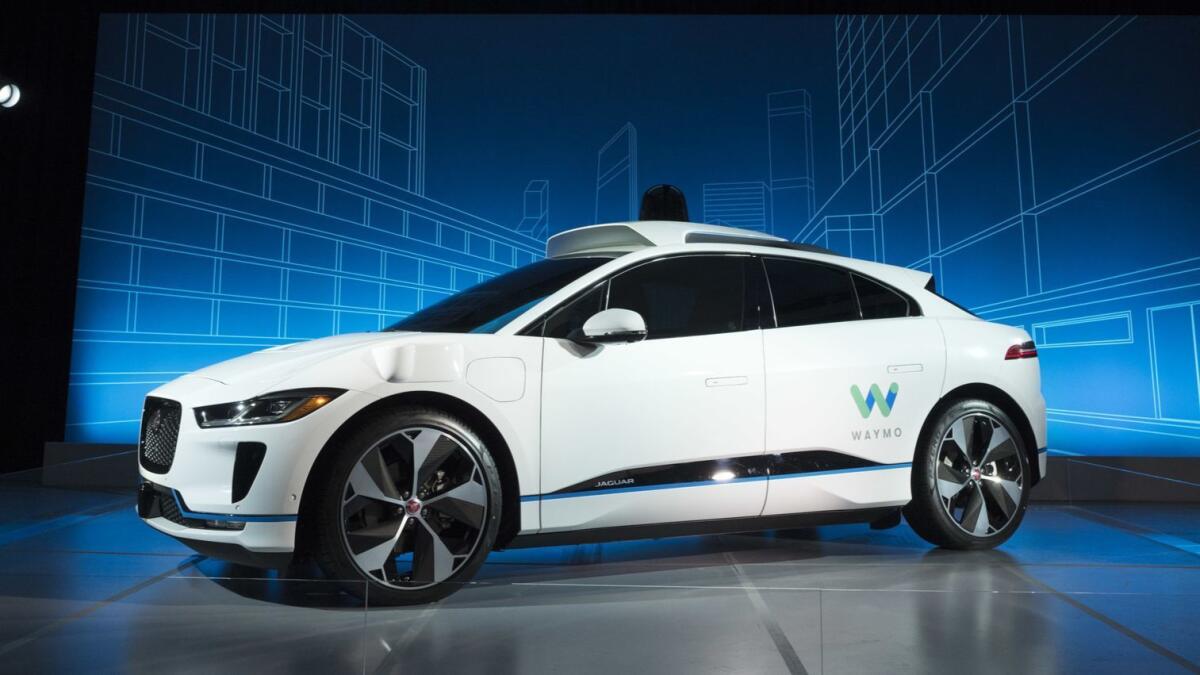Waymo is buying up to 20,000 Jaguars and plans to rev up a driverless ride-hailing service

- Share via
Reporting from San Francisco — In a dramatic commitment to driverless ride-hailing, Waymo said Tuesday that it is moving ahead with plans to put tens of thousands of driverless vehicles on public roads over the next several years.
Waymo, the driverless-technology arm of Google’s Alphabet, said it will buy as many as 20,000 luxury all-electric Jaguar I-Pace compact sport utility vehicles equipped with robot technology, and deploy them in its driverless fleet.
Already, Waymo offers a small-scale driverless ride-hailing service in and around Phoenix, in Chrysler Pacifica minivans. It plans to connect that service with a ride-hailing app later this year. No other company yet offers such a service.
The announcement comes as driverless technology is under harsh scrutiny. An automated test vehicle owned by Uber struck and killed a woman walking across a street in Tempe, Ariz., last week. Questions have been raised about whether the vehicle’s technology worked as intended, and a backup Uber driver was apparently distracted at the time of the collision.
Uber halted driverless-vehicle testing after the fatal crash. On Tuesday, Uber said it will not renew its permit to test autonomous vehicles on California public roads when it expires Saturday. The state Department of Motor Vehicles told the company that if it wants to return, it will need a new permit and must address investigations into the fatal crash in Arizona.
Toyota has also suspended driverless-vehicle testing, as has Nvidia, a company that makes the main processing chip for Uber’s driverless system.
Waymo Chief Executive John Krafcik, meanwhile, has begun a reassurance campaign trumpeting what he sees as the company’s superior technology. “We have a lot of confidence that our technology would be robust and would be able to handle situations like that one,” he told car dealers at a big Las Vegas convention on Saturday.
Waymo said it will begin testing the I-Pace later this year. Already Waymo has “thousands” of hybrid Pacifica minivans on order, and will add the I-Pace to its commercial fleet in 2020 as it expands driverless ride-hailing to other cities. With 20,000 vehicles, Waymo said, it could handle 1 million rides a day.
“This is bad news for other auto manufacturers who may have been working to become Waymo’s [choice],” said Alain Kornhauser, who heads the driverless transportation program at Princeton University. “To serve the billion [car] trips that occur on a typical day in the U.S., they’d need about 35 million vehicles. That’s where all this is going.” There were more than 260 million cars and light trucks registered in the U.S. as of late 2016, according to IHS Markit.
It’s unclear how consumers will react to fatalities such as Uber’s and whether that incident or others will slow down driverless-car development. Many safety experts believe driverless cars, though far from perfect, already are safer than human drivers. However, statistics to prove it may require hundreds of millions of miles of experience on public roads.
Some industry critics have called Arizona “Wild West” territory for its ultra-light approach to driverless regulation. Ducey greeted Uber to his state with great enthusiasm in late 2016, after the company encountered regulatory pushback in California. Arizona has few laws restricting the use of driverless vehicles. It doesn’t require remote operators for the vehicles, for instance, and allows driverless trucks on the road.
California recently issued a new set of regulations on driverless vehicles that goes into effect April 2. Companies can apply for permits to deploy driverless vehicles with no humans inside on public roads, with a tougher set of rules than are required in states such as Arizona and Florida.
Uber ride-hailing competitor Lyft has said it plans to offer driverless services in San Francisco at some point, but has remained silent on the Uber crash. In California, ride-hailing services are governed by Public Utilities Commission regulations, which will determine when and whether individual companies can offer robot ride-hailing.
The financial stakes are high, with experts predicting that the broader driverless-car industry, including vehicles for individual purchase, could be worth up to hundreds of billions of dollars a year. All major automakers, auto suppliers and most big technology companies are seeking to position themselves as industry players, along with countless startups.
The U.S. Department of Transportation is expected to release new regulatory guidance this summer. A bill that would ease deployment of robot cars has passed the House of Representatives; a similar bill is working its way through the Senate.
Meanwhile, Jaguar is counting on the Waymo news to brighten the spotlight on the new I-Pace, the first all-electric luxury vehicle to go up against Palo Alto-based Tesla.
“The partnership with Waymo puts an exclamation point on Jaguar’s comeback. Just a few years ago the company was struggling, but now they’ve made it clear that they’re thinking far beyond their sports-car heritage and are reaping the rewards,” said Jessica Caldwell, auto industry analyst at Edmunds.
The I-Pace has a $70,000 base price in the U.S. Customer deliveries are expected later this year.
UPDATES:
2:05 p.m.: This article was updated with details that Uber will not renew its license to test autonomous vehicles in California.
11 a.m.: This article was updated throughout with Times staff reporting.
This article was originally published at 7:35 a.m.







